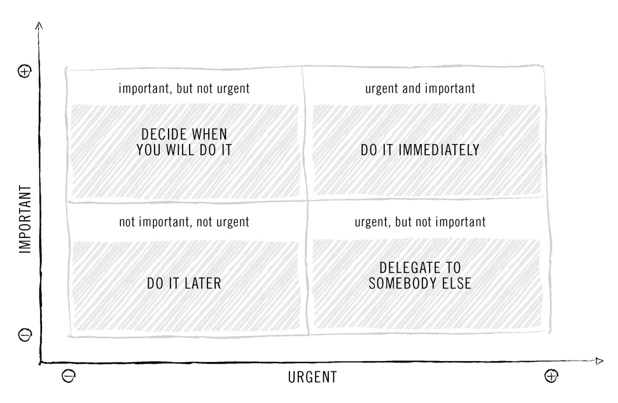Achieving work-life balance can look impossible. And, frankly, it seems like it’s getting harder.
In the ten years from 1986 to 1996 work-life balance was mentioned in the media 32 times.
In 2007 alone it was mentioned 1674 times.
Via The ONE Thing:
A LexisNexis survey of the top 100 newspapers and magazines around the world shows a dramatic rise in the number of articles on the topic, from 32 in the decade from 1986 to 1996 to a high of 1674 articles in 2007 alone.
The Onion jokingly implies that the only way to achieve effective work/life balance is to not have a job:
That’s hysterical — because it’s not remotely realistic. So what actually works?
You Need To Draw A Line
I’ve posted plenty of research on productivity, time management and procrastination – but that’s not the issue here. Not at all.
Those are hacks that help you be more efficient but in the modern world you are getting 25 hours of to-do’s thrown at you every 24 hours.
Thinking that if you spend enough time you will “get everything done” is an illusion. You will never be “done.”
The happiest people are not people who don’t have a care in the world. Those people are bored.
Research shows the happiest people are busy — but don’t feel rushed.
Anxiety is reduced by a feeling of control. And what do studies say about work-life balance? Same thing — a feeling of control is key.
You have to draw a line. You must decide what is important and what isn’t.
How do you draw that line? By asking yourself one simple question a few times a day.
“What’s The Most Important Thing For You To Do Right Now?”
The main problem people have is they try to do it all and treat everything as important.
You can’t do it all and everything is not equally important.
So how do you determine the most important thing for you to do right now?
1) What Are Your Values?
Clay Christensen, Harvard Business School professor and author of How Will You Measure Your Life?, knows what he values.
Watch from 34:55 to 38:50:
He works Monday to Friday. Saturday is for family and Sunday is for God. Period. No work on the weekends. No exceptions. No matter what.
Clay knows what’s important to him, drew a line and probably doesn’t suffer from many work-life balance worries.
Is this effective for everyone at every company? No. But you have to start with knowing what matters most to you and drawing a line.
2) What gets you disproportionate results?
Face it: often you start by doing whatever happens to be in front of you. But proximity does not equal priority.
In his book The ONE Thing, Gary Keller applies the “Pareto principle” to the workday:
Most of us get 80% of results from 20% of the work we do. So focus on that 20%.
What really creates progress vs treading water? What gives disproportionate results? Do that first and most frequently.
3) What’s the thing only *you* can do well?
If someone else can do the laundry at home, let them do it. If someone else can do the filing at work, let them do it.
But if you’re the parent, you need to be at the parent-teacher conference and if you’re the sales lead you need to be at the sales meeting.
Via The Effective Executive: The Definitive Guide to Getting the Right Things Done:
All in all, the effective executive tries to be himself; he does not pretend to be someone else. He looks at his own performance and at his own results and tries to discern a pattern. “What are the things,” he asks, “that I seem to be able to do with relative ease, while they come rather hard to other people?”
Management guru Pete Drucker says focus on the things that only you can do. Delegate, outsource or neglect the rest.
4) What’s most important right now?
You feel good when you check a lot of things off your to-do list. But were they things that are most important and urgent? That’s what matters.
Via The Decision Book: 50 Models for Strategic Thinking:

As the Eisenhower Matrix above reveals, just because something is urgent doesn’t mean it’s important.
And being important doesn’t necessarily mean it’s urgent.
And as Clay Christensen points out, it’s all too easy to put off important family time for urgent work deadlines.
If you’ve been neglecting your loved ones recently, work might be urgent but not important while family is both important and urgent.
Sum Up
So how do you deal with work/life balance? Here are some key ideas:
It’s not simple and it won’t be resolved tomorrow but you can get much, much better at this with time.
What’s the most important thing to remember?
You can do anything once you stop trying to do everything.
Join 45K+ readers. Get a free weekly update via email here.
Related posts:
4 Lifehacks From Ancient Philosophers That Will Make You Happier
What 10 things should you do every day to improve your life?
How To Make Your Life Better By Sending Five Simple Emails
This piece originally appeared on Barking Up the Wrong Tree.
More Must-Reads from TIME
- Cybersecurity Experts Are Sounding the Alarm on DOGE
- Meet the 2025 Women of the Year
- The Harsh Truth About Disability Inclusion
- Why Do More Young Adults Have Cancer?
- Colman Domingo Leads With Radical Love
- How to Get Better at Doing Things Alone
- Michelle Zauner Stares Down the Darkness
Contact us at letters@time.com



